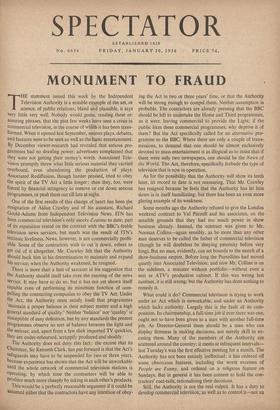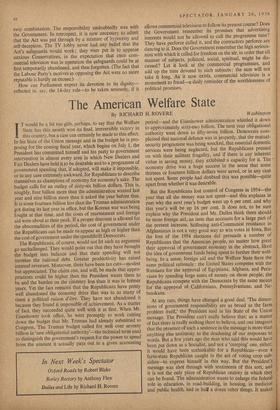MONUMENT TO FRAUD
THE statement issued this week by the Independent Television Authority is a notable example of the art, or science, of public relations; bland and plausible, it says very little very well. Nobody would guess, reading these re- assuring phrases, that the past few weeks have seen a crisis in commercial television, in the course of which it has been trans- formed. When it opened last September. serious plays, debates, and features were to be seen as well as the basic entertainment. By December viewer-research had revealed that serious pro- grammes had no draviing power; advertisers complained that they were not getting their money's worth. Associated Tele- vision promptly threw what little serious material they carried overboard, even abandoning the production of plays. Associated Rediffusion, though harder pressed, tried to obey the spirit of the TV Act a little longer: then they, too, were forced by financial stringency to remove or cut down serious programmes, or push them out till late at night.
One of the first results of this change of heart has been khe resignation of Aidan Crawley and of his assistant, Richard Goold-Adams from Independent Television News. ITN has been commercial television's only succes d'estime to date; part of its reputation rested on the contrast with the BBC's feeble television news services, but much was the result of 1TN's Intrinsic liveliness. News, however, is not commercially profit- able. Some of the contractors wish to cut it down, others to get rid of it altogether. Mr. Crawley felt that the Authority should back him in his determination to maintain and expand his service; when the Authority weakened, he resigned.
There is more than a hint of sarcasm in his suggestion that the Authority should itself take over the running of the news service. It may have to do so: but it has not yet shown itself Capable even of performing its minimum function of com- pelling the contracting companies to obey the TV Act. Under the Act, the Authority must satisfy itself that programmes maintain a proper balance in their subject matter and a high general standard of quality.' Neither taldrice' nor 'quality' is susceptible of easy definition, but by any standards the present programmes observe no sort of balance between the light and the serious; and, apart from a few slick imported TV quickies, they are under-rehearsed, scrappily produced and shoddy.
The Authority does not deny this fact : the excuse that its Chairman. Sir Kenneth Clark, has put forward is that the Act's safeguards may have to be suspended for two or three years. because experience has shown that the Act will be unworkable until the whole network of commercial television stations is operating; by which time the contractors will be • able to produce much more cheaply by taking in each other's products.
This would be a perfectly reasonable argument if it could be assumed either that the contractors have any intention of obey- ing the Act in two or three years' time, or that the Authority will be strong enough to compel them. Neither ,assumption is probable. The contractors are already pressing that the BBC should be left to undertake the Home and Third programmes, as it were, leaving commercial to provide the Light; if the public likes these commercial programmes, why deprive it of them? But the Act specifically called for an alternative pro- grammre to the BBC. Where there are only a couple of trans- missions, to demand that one should be almost exclusively devoted to mass entertainment is as illogical as to insist that if there were only two newspapers, one should be the News of the World. The Act, therefore, specifically forbade the type of television that is nOw in operation.
As for the possibility that the Authority will show its teeth later, its record to date is not reassuring. That Mr. Crawley has resigned because he feels that the Authority has let him down is in itself humiliating; but there has been an even more glaring example of its weakness.
Some months ago the Authority refused to give the London weekend contract to Val Parnell and his associates, on the sensible grounds that they had too much power in show business already. Instead, the contract was given to Mr. Norman Collins—again sensibly, as he more than any other man deserves to be called the father of commercial television (though he will doubtless be denying paternity before very long). But no man, evidently, can set bounds to the march of a show-business empire. Before long the Parnellites had moved quietly into Associated Television; and now Mr. Collins is on the sidelines, a minister without portfolio—without even a seat in ATV's production cabinet. If this was wrong last summer, it is still wrong; but the Authority has done nothing to remedy it.
What could it do? Commercial television is trying to work under an Act which is unworkable, and under an Authority which lacks authority. Largely this is the fault of its com- position. Its chairmanship, a full-time job if ever there was one, ought not to•have been given to a man with another full-time job. As Director-General there should be a man who can display firmness in making decisions, not merely skill in ex- cusing them. Many of the members of the Authority are scattered around the country; it meets at infrequent intervals— last Tuesday's was the first effective meeting for a month. The Authority has not been entirely ineffectual; it has ordered off some obnoxious features, including the worst excesses of People are Funny, and ordered on a religious feature on Sundays. But in general it has been content to hold the con= tractors' coat-tails, rationalising their decisions.
Still, the Authority is not the real culprit. It has a duty to develop commercial television, as well as to control it—not an easy combination. The responsibility undoubtedly was with the Government. In retrospect, it is now necessary to admit that the Act was put through by a mixture of hypocrisy and self-deception. The TV lobby never had any belief that the Act's safeguards would work : they were put in to appease anxious Conservatives, in the expectation that once com- mercial television was in operation the safeguards could be at first temporarily abandoned, and then forgotten. (The fact that the Labour Party's motives in opposing the Act were no more reputable is hardly an excuse.) How can Parliament expect its devotion to its dignity— reflected in. say, the 14-day rule—to be taken seriously, if it allows commercial television to follow its present course? Does the Government remember its promises that advertising interests would not be allowed to call the programme tune? They have perforce called it. and the contractors perforce are dancing to it. Does the Government remember the high serious- ness with which it called for freedom on the air, in order that all manner of subjects. political, social, spiritual, might be dis- cussed? Let it look at the commercial programmes, and add up the time devoted to such subjects: the sum will not take it long. As it now exists, commercial television is a monument to fraud—a daily reminder of, the worthlessness of political promises.



































 Previous page
Previous page